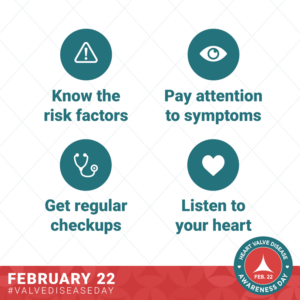By: The Alliance for Aging Research
Heart valve disease is a type of heart disease that affects one or more of the heart’s four valves and causes them to not open or close properly, disrupting blood flow. While some types of valve disease aren’t serious, others can lead to major complications, including death.
Despite how serious it can be, and the fact that more than 11 million Americans are impacted by valve disease, awareness is low.
A survey conducted by the Alliance for Aging Research found that an estimated 3 in 4 Americans have little to no knowledge of valve disease. This is why the Alliance started the Heart Valve Disease Awareness Day campaign. Every February during American Heart Month and the campaign’s 125 partners come together to spread awareness because successful outcomes depend on understanding risk factors, recognizing symptoms, and receiving timely medical treatment.

So who is at risk?
Other cardiovascular diseases and conditions such as a previous heart attack, hypertension, and high cholesterol can also increase risk. Diabetes and treatments for certain types of cancer can also be risk factors. It’s important to note that, because some of these risk factors are more prevalent in black Americans, valve disease can develop at a younger age, which highlights the importance of when to start screening for valve disease.
Age is the most common risk factor—with 1 in 10 adults over age 75 impacted by the disease.
Symptoms of heart valve disease can include feeling light-headed or fainting; irregular heart rhythm or chest pain; shortness of breath after light activity, tiredness, edema (swelling in the feet or ankles), or feeling “off” in general.
These symptoms can be similar to those for other conditions or may even be improperly dismissed as a “normal” part of aging, so it’s important to talk to a medical professional about getting a stethoscope check. Listening to the heart with a stethoscope may reveal a heart murmur, or irregular heart sound that can come with valve problems.
If someone experiences a heart murmur they should see a specialist for more testing.

While valve disease usually can’t be prevented, it can be successfully treated in patients of all ages. Treatment is generally surgical and it’s important to consult a healthcare professional to discuss your options. The good news is, most patients report returning to “normal” life after treatment.
Every February, as non-profits, professional societies, hospitals, and heart centers come together to raise awareness about this disease, learn more at www.ValveDiseaseDay.org and make sure you #ListentoYourHeart





